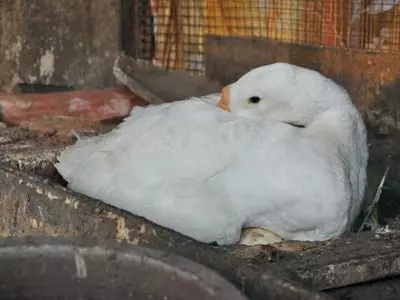No products in the cart.
Ducks
How Many Eggs Do Ducks Lay Per Year? (+ Per DAY)
Although chickens are probably the first thing that comes to mind when thinking of eggs, ducks are also becoming a popular choice.
Ducks lay bigger eggs that are more nutritious and have a different taste from chicken eggs, and their shells tend to be thicker, making them last longer.
So, how many eggs do ducks lay per day and per year?
The typical duck lays 1 egg every day or 2 days, much like chickens. However, this varies on breed, location (free range or cage), nutrition, and management. Finding a fast-laying breed and taking good care of your flock are essential for producing healthy eggs.
We’ve broken down all the information about duck eggs you need to know including nutrition and care and of course, explore how many eggs ducks lay!
*This post may have affiliate links, which means I may receive commissions if you choose to purchase through links I provide (at no extra cost to you). As an Amazon Associate I earn from qualifying purchases. Please read my disclaimer for additional details.
How Many Eggs Ducks Lay

A duck lays an egg every day or 2 days on average although age and breed are two factors that affect how often your duck will lay.
Some of the outliers include Mallards, which produce only about 140 eggs per year, while on the higher end, Khaki Campbells lay about 300 each year.
Factors for Egg Production
Egg production in ducks is significantly impacted not only by their breed but also by age. Although a healthy duck’s lifespan can reach 12 years, it will lay fewer eggs as they age.
Their prime egg-laying period occurs between ages 1 and 4, after which point production steadily decreases until stopping altogether between 7 and nine 9 old.
The breed of duck primarily controls egg production. While the lowest-yielding ducks produce about 140-190 eggs annually, the highest-yielding varieties can make up to 350.
Read our related article, Chicken Egg vs Duck Egg Taste, where we explore the difference between duck and chicken eggs!
Which Ducks Lay the Most Eggs?
While the Khaki Campbell duck, on average, will lay 340 eggs per year, there are other great breeds to consider.
When picking a species of duck, it’s not only essential to think about how many eggs they lay each year, but also their fertility, and if they’re able to forage for food themselves.
The table below shows some of the most common breeds and how many eggs they are expected to lay yearly.
Annual Egg Production by Breed
| Duck Breed | Amount of Eggs Annually |
|---|---|
| Khaki Campbell | 250-340 |
| Welsh Harlequin | 240-330 |
| Runner | ~300 |
| Magpie | 240-290 |
| Gold Star Hybrid | 200-290 |
| Silver Appleyard | 220-265 |
| Ancona | ~240 |
| Saxony | 190-240 |
| Buff (Orpington) | 150-220 |
| Pekin | ~200 |
| Muscovy | 180-200 |
| Cayuga | 100-150 |
How Many Eggs Does a Duck Lay Before Brooding?

A duck will brood once she has a complete clutch of eggs. A clutch is usually between 8 and 15 eggs.
If you want to see ducklings quicker, you can take eggs and incubate them in a duck incubator. Incubators are more convenient for those looking to breed ducks for meat or eggs without having to wait on mother duck to sit on her eggs.
Read our related article on the Best Duck Egg Incubator. We reviewed tabletop, cabinet, and medium-sized incubators to help you find the right incubator for your needs!
Do Ducks Lay Eggs Year-Round?
Generally, hens produce the most eggs in spring and summer (March-August) and the least in winter (October-February). However, different duck breeds have diverse laying habits. Some lay eggs year-round while others only lay seasonally.
Read More: How Long Do Ducks Sit On Eggs to Hatch? We explore the nesting habits of ducks and how hens prepare for new ducklings!
Methods to Increase Egg Production
If you want to encourage laying during the winter months, place a light in their den or coop to mimic the sunlight they receive in the summer months. Just ensure that you don’t have the light running all the time, and give them at least 8 hours of downtime.
Remember that, like chickens, ducks will lay more eggs if their nutritional needs are met. If you give them a healthy diet and stress-free environment, they will lay more often.
Read More: How Do You Incubate a Duck Egg You Found? This COMPLETE guide goes through every step of incubation to help you through the process!
Why You Should Raise Ducks for Eggs
Chicken eggs may be more plentiful and common, but there are reasons duck eggs are gaining popularity. Duck eggs have a richer flavor and are fluffier when cooked.
Here’s a video that compares duck eggs to chicken eggs and lists some benefits:
Now that you know the difference between duck and chicken eggs, what are the main benefits of raising ducks for eggs?
Read More: How Long Can Ducks Survive Without Water? Ducks are always around water, but can they go without it? How long? We answer these questions and more!
More Eggs
While chickens certainly produce a lot of eggs (up to 250 per year), many duck species can produce up to 100 more eggs than your average chicken! If you plan to sell eggs at your local farmer’s market or start a business, this means a larger profit.
If your goal is to be self-sufficient, more eggs are always welcomed and duck eggs can be used in a variety of dishes just like chicken eggs.
Read our related article on How to Make a Homemade Duck Egg Incubator. Homemade incubators can work just as well as store-bought ones to hatch ducklings. Learn how to make your own!
Prolonged Shelf Life
Because a duck’s egg has a thicker membrane and shell, it can be kept longer than a chicken’s. Actually, duck eggs can be kept and used up to a month longer than a chicken’s eggs!
To put that in perspective, you can keep chicken eggs for about 2 weeks unrefrigerated, and 2 or 3 months refrigerated. Duck eggs can be kept unrefrigerated for 3 weeks, and for 4 months when refrigerated.
Richer in Nutrients
Did you know that duck eggs are more nutrient-dense than chicken eggs?
This is because they contain higher levels of vitamins, proteins, iron, and omega-3 fatty acids.
So if you’re looking to pack a punch at breakfast, a duck egg is the way to go.
Great for Cooking
You can use and cook duck eggs the same way you would use chicken eggs.
The only thing you have to be mindful of is the size and weight of a duck egg compared to a chicken egg.
Try to find recipes that use duck eggs, or play around with you recipes to see how many duck eggs you should use to replace chicken eggs.
Read our related article, How Big is a Duck Egg in Inches? to learn how big duck eggs are in size and weight!
How to Make Sure Your Ducks Lay Lots of Healthy Eggs

1. High-Quality, Nutrient-Dense Feed
As the old saying goes, “you are what you eat!” This is also true for ducks and the eggs they lay.
By feeding your ducks high-quality food that’s nutrient-dense, you can ensure that they’re getting the vitamins and minerals they need to produce healthy eggs – and a lot of them.
You’ll also want to make sure they have plenty of access to the outdoors and grass, as this will expand their diet to bugs and wild seeds or plants.
TIP: We definitely encourage you to use non-GMO or organic feed. Whatever your ducks eat, you or your customers will eat, so keep that in mind!
Read our related article, How Much Does a Duck Weigh in Pounds? Some ducks can weigh up to a heavy 12 pounds! Here’s the average weight of ducks.
2. Adequate Hydration
Clean water is essential for all farm animals.
Keep your ducks at their healthiest by providing them with plenty clean, fresh, and cool water. If the water is not indoors, make sure it has shade to avoid getting too hot during the summer months.
If you have a small flock, we suggest cleaning the water daily. For large flocks, a self-cleaning and filling water system may be worth considering.
TIP: Remember not to have the water too deep for young ducklings, as this may lead to accidental drownings.
3. Sufficient Lighting
Different ducks’ egg-laying rates are affected by the length of daylight that they’re exposed to.
However, in general, longer days encourage increased egg production, while shorter days decrease or stop egg laying.
To boost the number of eggs your ducks lay, provide artificial light to ensure that they get about 15 hours of sunshine each day.
TIP: Allow your ducks to experience total darkness for at least 8-10 hours to rest.
Read our related article, Do ducks keep the same mate for life? to learn about duck mating behavior!
4. Lack of Stress and a Routine
It’s best to feed, collect eggs, and let your ducks out of the coop at the same time every day.
A duck’s capacity to lay eggs improves with consistency in a daily routine.
Unexpected intrusions could lead to stress, and stress leads to fewer eggs.
Stress can also come from loud noises and animals threatening ducks and ducklings (like dogs or cats), so be sure that your ducks have a quiet place away from potential predators.
5. Limit Number of Males
If you have ducks and want them to mate, it’s best only to only have 1 drake for every 5 to 6 ducks to achieve a successful mating season.
REMEMBER: If you don’t want ducklings, don’t have a drake. Ducks will still lay eggs without fertilization from a male duck.
Read our related article, What is a Male Duck Called? where we discuss the differences between male and female ducks, the proper name for male ducks, and more duck facts!
6. Overcome Boredom
Ducks are social animals that enjoy the company of others.
If ducks become isolated and bored, they may stop laying eggs or produce fewer eggs than usual.
To prevent this from happening, it’s best to keep at least 3 ducks so they can learn to interact with one another and have company.
Read our related article, Why Did My Chickens Stop Laying Eggs in Summer? Chickens can stop laying for various reasons – learn why.
Conclusion
Duck eggs are nutritious, delicious, and plentiful as long as you take good care of your ducks, and ensure a great environment for them to lay. We hope this article got you on the right track to enjoying many duck egg omelets!

